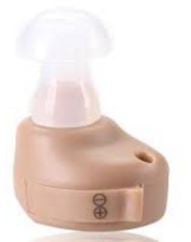Time to Read: 6 minutes
Opportunists alert!
There has been much publicity around the state of the hearing industry over the past two years and the high prices some clinics charge for their hearing aids. While this is true in many cases, it is not a complete picture of the industry. It has also opened the door for a few unscrupulous predators to come into the market preying on people’s perception that hearing aids are generally overpriced in Australia.
Low cost Hearing Aids with a major catch!
These things aren’t Hearing Aids at all!
Several online providers have started advertising hearing aids for as low as $119 each including shipping. These devices look like hearing aids to you, the consumer, and are advertised as hearing aids, but actually aren’t hearing aids at all. For instance, one online spa company, yes spa with water and jets etc., was actually selling “hearing aids” online which you can obtain online from Alibaba for $13.95 at $120 each. They even claim these devices work as well as hearing aids thousands of dollars dearer. They proudly gave you a laughable 7 day money back guarantee, which is not even enough time to receive, try and return the devices!
These days the amount of companies on Facebook selling "hearing aids" directly for less than $200, are increasing adn by the comments on their ads it looks like many consumers are highly interested. They often use real hearing aid related imagery in the aids, but they sell something different. Their hope is that the price is low enough for you not to bother with returning them or alternatively make the return process to difficult to bother with. This is concerning for a number of reasons.
The claims, that these low priced “hearing aids” work as well as more expensive models, would be fantastic if this was in fact true, but unfortunately we seem to have entered the domain of the snake oil salesman. What these retailers are in fact selling are Personal Sound Amplification Products (PSAPs) and not even quality ones at that. These are devices that look like hearing aids, but are not regulated medical devices. They are generally built for one function: to make everything louder for people without hearing loss. But they aren’t set to a person’s specific hearing loss. If fitted without medical guidance, they have been known in some instances to cause immediate damage. They often don’t have the level lowering protection mechanisms that hearing aids have, and so may actually add to your hearing loss over time as well.
A major concern here is that a person with hearing loss, unaware of the performance differences between a hearing aid and PSAP, might try a PSAP, thinking it is a hearing aid. You might find the performance, fit and sound quality highly unsatisfactory. This experience may then result in you deciding that hearing aids do not work. This could lead you to miss out on the opportunity of benefiting from the quality of life improvements that properly selected and fitted TRUE hearing aids can bring. Now that untreated hearing loss is also more strongly correlated to cognitive decline, the importance of good hearing aids has significantly higher as well.
As with everything else in life, there are different quality levels of PSAPS. Those costing less than $300 each are generally poorer quality, while those costing over $300 tend to have better sound quality and even some noise reduction built in. The key difference factor between a hearing aid and PSAP is that generally PSAPs cannot be adjusted to your hearing loss configuration. They do, however, often have volume controls, so don’t confuse this with suitability for hearing loss.
Some companies use higher quality PSAP advertised as hearing aids priced at $349 each to get you to visit their site. They then have higher cost models available with better features. Their highest cost model is actually an unknown brand basic hearing aid which is priced similarly to a quality brand name basic hearing aids that can be obtained locally at an audiologist. So you could end up paying the same price online for a no name brand hearing aid, without the 3 year warranty and professional care that goes with getting a true hearing aid from an audiologist.
So this is indeed a case of buyer beware!
Here are a few more articles relating to this issue:
http://www.fda.gov/ForConsumers/ConsumerUpdates/ucm185459.htm
http://www.starkey.com/blog/2015/05/PSAPs-Are-Cheaper-So-Why-Should-I-Buy-Hearing-Aids
